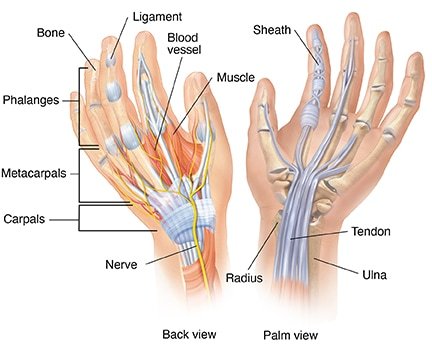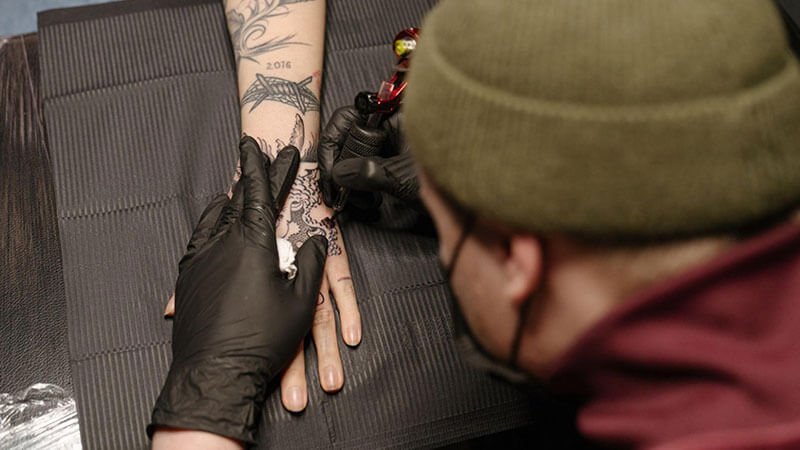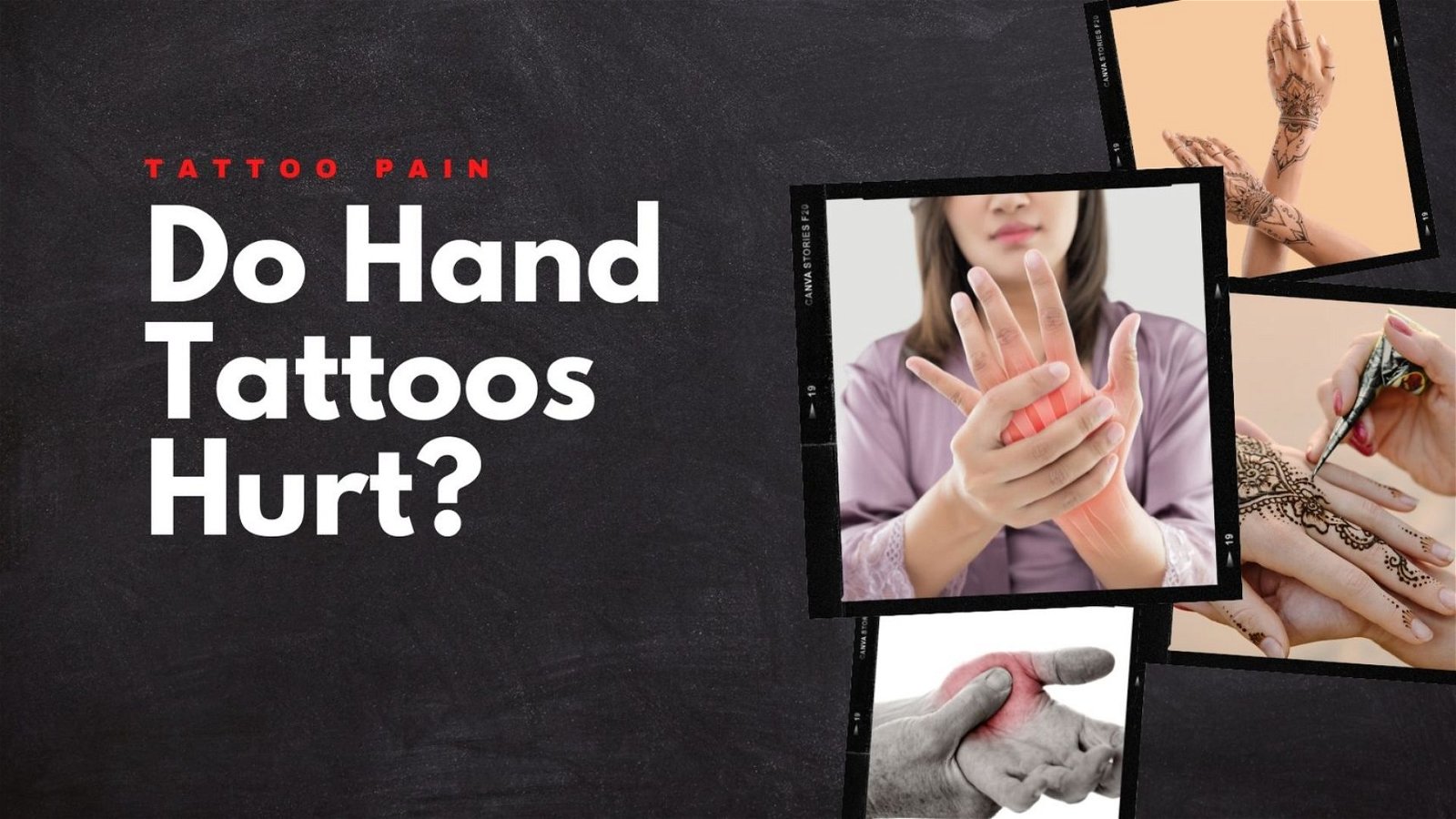Are you looking to get a hand tattoo, but you’re not sure how much the tat will hurt? Not knowing how much pain a hand tattoo can lead to negative experiences in the tattoo chair.
On top of that, if you leave halfway through because you can’t handle the pain, then you’ll be left with an unfinished public-facing tattoo.
So, how much does a hand tattoo hurt? What factors influence pain, and what can you do to tolerate the pain before, during and after your tattoo?
Hand Tattoos: Is It Painful?
If you want a straightforward answer, hand tattoos are painful.
Many people report that hand tattoos are more painful than other body areas. These painful instances have something to do with the innate structure of the human hand and other major factors that affect our sense of pain.

As you can see in the image above, the hand is full of bones, muscles, ligaments, tendons, and nerves. These structures support our hands and enable them to have a wide range of movements any other mammal can’t do.
And since the hand is full of these supporting structures, getting tattooed in this part of the body can be more painful than muscle-filled parts such as the calves. One reason is that your hand skin is thin, meaning your bones and muscles can be easily impacted by the tip of the tattoo pen.
Simply put, the thinner your skin is, the more you’ll likely be in pain when getting a tattoo in the area.
Aside from thin skin, the hands, particularly the palm and fingers, are also full of nerve endings that may overload with pain once impacted by the tip of the tattoo pen. Body parts that pack a lot of nerve endings are renowned for being the most painful places to have a tattoo, although this depends on your gender.
How Painful Is Hand Tattooing?

Pain is a personal and individual experience, and we can’t say for sure how painful it is to get your hands tattooed. However, there are things to consider when going for a hand tattoo if you’re thinking about pain:
Hand Tattoo Designs & Sizes
Tattoo size plays a significant role in tattoo pain perception.
The larger the skin surface tattooed, the more painful it is. Opt for a smaller tattoo for your hands to minimise hand tattoo pain. Or, you can read about wrist tattoo pain here.
Specific shapes and designs can also contribute to pain. Geometric tattoos, for example, use extensive linear patterns, which can sting a lot since the tip of the tattoo pen runs along the same part of your skin again and again.
Traditional tattoos can also sting a lot since they highlight bold lines and solid colours to communicate with your artist thoroughly, knowing what’s best for you.
Hand Tattoo Duration
Your tattoo session will hurt more the longer it takes. Larger tattoo sizes and complicated shapes and patterns cause tattoo sessions to be longer. Simply put, the longer your tattoo session takes, the more it will hurt. Ask your artist how long the session(s) will take, so you can request a numbing tattoo gel applied to the skin to help subside the pain.
How to Make Hand Tattoo Session Hurt Less?
Hand tattoos can be painful, and preparing for your tattoo session may help reduce the in-session pain. Here are some tips to prepare for your tattoo session:
- Keep yourself properly hydrated. A properly hydrated body leads to better skin elasticity and resiliency against irritants such as the ink and tip of the tattoo pen. It also makes sure your body has fuel.
- Have a good night’s sleep beforehand. Sleep deprivation messes with our body, and specifically, our brain. Get a good night of sleep, preferably at least 8 hours the night before your tattoo session.
- Don’t drink alcohol 24 hours before. You may think it dulls your senses for a painful tattoo, including your general pain perception. However, studies say no to this, and you should be sober 24 hours before your tattoo session to reduce tattoo pain.
- Eat a good meal before your session. Keeping your blood sugar intact during the session helps you resist and potentially reduce pain. It also helps keep your mood steady, so you don’t feel irritable or cranky after the session and helps keep your skin much soft and supple.
- Think positively. Before you get your hand tattoo, be sure you’re happy, okay, and excited with this. Thinking the opposite may lead to a worse situation. If you believe getting tattooed will ache a lot, it probably will. So think positively.
Keep analgesics handy. Take a tab of analgesic at least 30 minutes before the session to reduce the pain. Paracetamol (acetaminophen) and ibuprofen are great but only take the recommended dosage to allow it to work correctly. Taking analgesics isn’t a requirement, though, and it depends on you if you want to reduce pain or you’re confident you can handle the pain.
Tattoo Aftercare
After your tattooing session, you need to follow a series of aftercare work so your tattoo will heal properly. Here’s how you execute it:
- Wash your skin with gentle soap and water. This prevents infections that may cause a whole host of problems for your skin and tattoo.
- After washing, use an antibacterial cream. Spread the cream thinly across the site and cover with a soft bandage afterwards.
- If in pain, use a skin numbing cream. Topical painkillers work well for tattoos, but be sure to use this moderately so your skin won’t get used to it.
If you experience sudden piercing or scratching pain, go to your GP. They will advise you on the correct way to handle the healing process of your tattoo.
Do Palm Tattoos Hurt More Than the Hands?
Possibly. As mentioned earlier, the hands are full of nerve endings. But in this case, the palm is much more packed with nerve endings than the hand itself. One good experiment to try and see what hurts more is to grab a pen and write something on your hands and do the same for the palm. As for me, the palm hurts way more than the hands themselves.
Sources:
- Top 10 things that make humans special.
https://www.livescience.com/15689-evolution-human-special-species.html
- How do hands work?
https://www.ncbi.nlm.nih.gov/books/NBK279362/
- The Effect of Age and Gender on Pressure Pain Thresholds and Suprathreshold Stimuli.
https://journals.sagepub.com/doi/abs/10.1068/p7847?journalCode=peca&
- Dietary water affects human skin hydration and biomechanics.
https://pubmed.ncbi.nlm.nih.gov/26345226/ - Health Effects of Sleep Deprivation.
https://apps.dtic.mil/sti/citations/ADA249653
- Acute alcohol effects on conditioned pain modulation, but not temporal summation of pain.
https://journals.lww.com/pain/Abstract/2019/09000/Acute_alcohol_effects_on_conditioned_pain.16.aspx
- Acute Hypoglycemia Induces Painful Neuropathy and the Treatment of Coenzyme Q10.
https://www.ncbi.nlm.nih.gov/pmc/articles/PMC4707338/
- An Investigation into Over the Counter Painkiller Use.
https://sword.cit.ie/iujhs/vol1/iss1/7/





